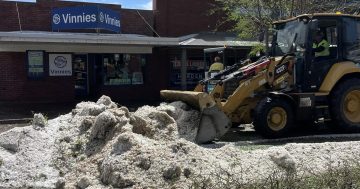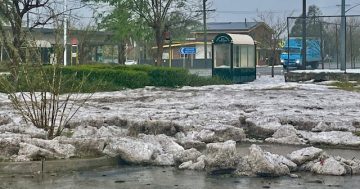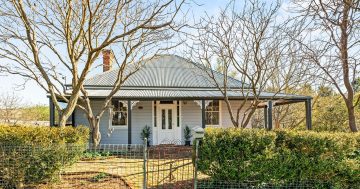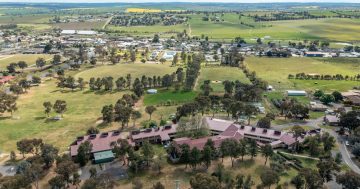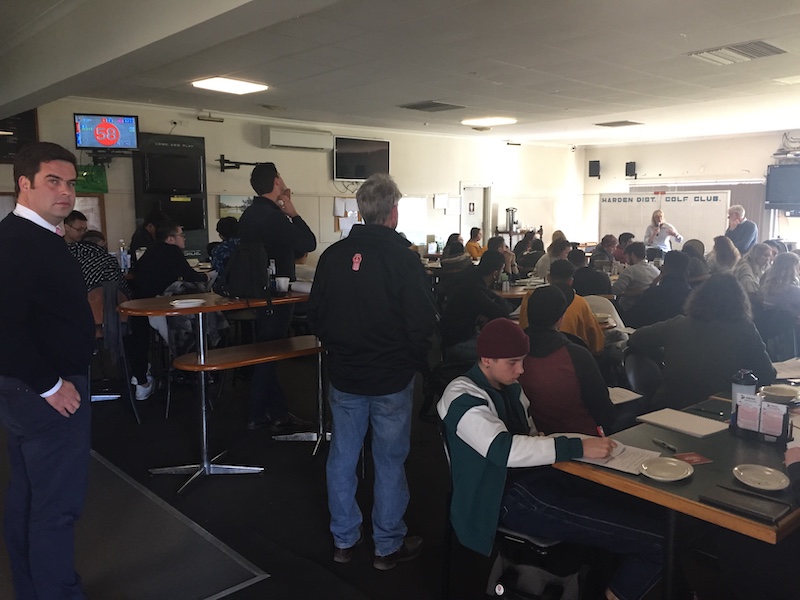
Harden Regional Development Corporation chair Richard Fleming (left) at the briefing session for University of Canberra architectural students on Thursday. Photo: Supplied.
Brimful of ideas, Tony Holland is about to meet 50 architectural students and staff from the University of Canberra visiting Harden.
The chief operations manager for Harden Regional Development Corporation, Mr Holland says an architect designing the new Harden Country Club has invited the students to a briefing session. They are working with a local developer on a new residential development for the community. Mr Holland hopes the corporation’s meeting is the beginning of a long-term relationship between the architectural students and the town, one-and-a-half-hours drive from Canberra.
More than $45 million worth of capital works are either underway or in the planning pipeline for Harden, including a new rural fire service regional training centre, $28 million hospital and $3-$4 million upgrades to recreational facilities from State Government grants.
The new country club is the latest project under the Kruger Trust for a state-of-the-art, family-friendly venue for events. Bequeathed by dentist, the late Geoff Kruger, a generous legacy has funded key infrastructure projects in Harden, including a new medical centre.
“The trustees are committed to using their funds carefully, including a brand-new country club. It provides opportunities that most other country towns just don’t have. It doesn’t mean people can come to town and get a hand out from the trust, it means where there are opportunities for genuine growth, there is a trust that will provide funding for infrastructure, dollar for dollar matching grants, all sorts of things are possible in seeing the community grow,” Mr Holland says.
Hilltops Mayor Brian Ingram and general manager Edwina Marks say the centre provides access to local medical services and visiting specialists, so people in the community don’t have to travel over an hour to see a GP. “There is visiting medical officer support for the hospital. It has provided employment opportunities within Harden,” Cr Ingram says.
Mr Holland says: “The big push for this community is to attract people from Canberra to re-locate to Harden, that is our single biggest push, to see Harden as the friendliest, most welcoming, engaging community in Australia on the doorstep of Canberra.
“If you look at the way the (affordable housing) wave has gone, Murrumbateman, Bungendore, Gundaroo, Yass, which is ridiculously expensive now, the next wave out is Harden and Boorowa,” Mr Holland says.
“We are not talking about 10,000 people moving here. We are saying growth between two and five per cent per year is likely over the next 10 years which will have a dramatic change to the infrastructure in town.” He says five or six families have re-located from Sydney and Canberra in the past six months, and if more people continue arriving, shops, and perhaps artisans will follow, opening a new studio perhaps or a jewellery shop.
A cereal crop-growing and livestock grazing district noted for reliable rainfall, Harden’s agriculture sector is changing into bigger operations with mechanisation replacing farm labour. Mining has become the second biggest producer in the region, including a lime mine at Galong.
Mr Holland says aside from economic activity, professional people are focused on the social and emotional wellbeing of the people within the community. “We want to make sure people understand you are not going to be left behind if you move to a country town, particularly to Harden,” he says.
On the Burley Griffin Way and main southern railway line with passenger train services to Sydney and Melbourne, Harden is not isolated. “It is a strong opportunity for tele-commuting, part-time work, and a tree change,” Mr Holland says.
Proximity to the national capital became even more apparent last October when the annual Harden kite festival attracted more than 8000 people, more than double the previous year, with Canberrans making up most of the visitors.
Coming from the not-for-profit sector in Canberra where he had worked in mental health and chronic disease, Mr Holland was drawn to the opportunity to help Harden grow. “The more I become aware of what is possible, the more excited I become. I am a real advocate for rural Australia,” he says.
“People live in capital cities for all sorts of reasons. But the cities are bursting at the seams, we have so much potential in places like Harden, Young, Boorowa and hundreds of other towns. If we build a community that is known far and wide that is the most engaging, friendly welcoming place you could go, why wouldn’t you want to move here? Once people know that, once land is available, and we create some jobs, which I think will happen, then people are going to flock to come here.”












